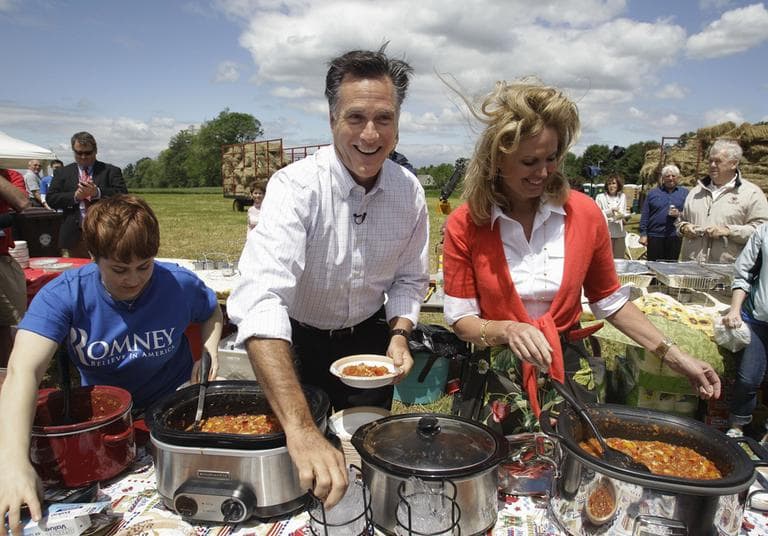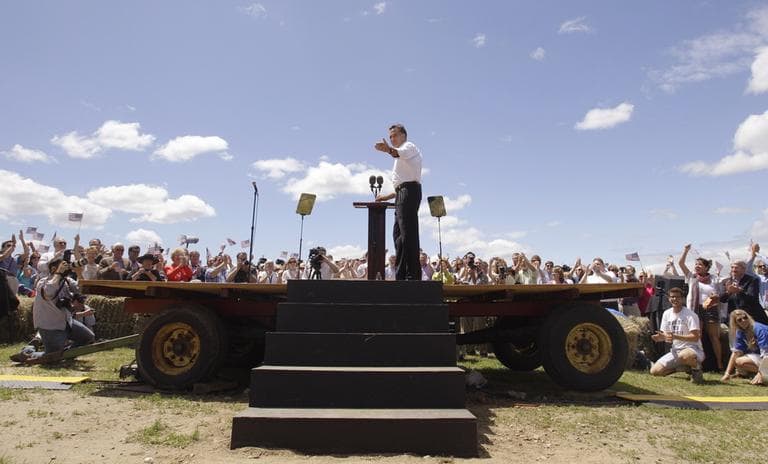Advertisement
Romney Picks His Ground: A Farm In New Hampshire

Mitt Romney begins his second quest for the presidency in first place, in a state he's counting on. Romney picked the Scamman Farm in Stratham, N.H., to make official what has been obvious for years.
"I'm running for president of the United States," Romney told hundreds of people Thursday.
Props have been a big part of Romney's campaign kickoffs. Four years ago, in Michigan, there were actual props — propellers — around him at the Henry Ford Museum. Romney picked the state where he grew up, a state his father ran as governor after running American Motors, to announce his run. It was a time to emphasize his own business know-how.
This time, Romney is still emphasizing his business credentials, but the props were bales of hay on the Scamman Farm. It could be that Romney is trying to show a more down-home side, but it's also true that the farm is a frequent backdrop for major New Hampshire political events. The owner, Doug Scamman, is a former speaker of the New Hampshire House. George W. Bush drew big crowds there in his two runs for the White House.
For Romney's campaign kickoff, he and his wife, Anne, brought some chili (Ann's recipe), made at Romney's campaign headquarters in Boston's North End.
Four years ago, Romney came in second in New Hampshire, and dropped out after a devastating Super Tuesday. This time around, all around New Hampshire, voters are saying they like Romney.
"We have a lot of peppers here, a lot of chopped peppers, chopped onions, some white — what are they called? Canelli beans?" he asked his wife.
This was a chili cookout, so of course Romney was in shirtsleeves as he addressed the hundreds of people who had parked their cars in the Scammans' rolling hills.
"My guess is that everybody here has a different story they could tell," Romney told the crowd.
Beth Salzman's story is that she's worried for her children.
"I have a sense that maybe the future for my kids isn't as great as it was for me," she said.
The people who came to hear Romney had different reasons for being there. Some were die-hard supporters. Salzman was there because she was curious, and so was her friend Rhonda Bernstein.
"The two-state situation in the Middle East with Israel and Palestine," Bernstein said. "I'd like to see where specifically — it's one thing to say: 'Yeah, I support the state of Israel.' Well, in what capacity? Let's get more specific because here are specific proposals on the table. Let's get specific about where you might stand on some of those."
Advertisement
And they got to hear Romney's take on President Obama's approach to Israel.
"He seems firmly and clearly determined to undermine our long-term friend and ally," Romney said. "He's treating Israel the same way so many European countries have, with suspicion and distrust and assumptions that Israel is somehow at fault."

Four years ago, Romney also tried to identify the Democrats' approach as European.
Four years ago, he was trying to figure out how much to play up his accomplishment of helping make Massachusetts the first state with nearly universal health care coverage. Since Obama adopted the idea of making people buy health insurance, Republicans across the country have turned against it, and so Romney must now address the issue in his second quest for the nomination. The crowd at the farm sounded like it wasn't quite sure how to respond to what he had to say about why he pushed for the individual mandate when he was governor of Massachusetts.
"I also found the state was giving over $1 billion away in free health care, much of it to people who could have paid something, who were just gaming the system," Romney said. "You won't be surprised that a lot of Democrats thought we should give them even more. I took on this problem and hammered out a solution that took a bad situation and made it better. Not perfect, but it was a state solution to our state's problem."
The applause was hesitant at first, as it was when Romney mentioned a constitutional amendment not heard about every day.
"I'm going to insist that Washington learns how to respect the Constitution, including the 10th Amendment," Romney promised.
The 10th Amendment reserves to the states and the people all the rights not explicitly granted to the federal government.
Four years ago, Romney came in second in New Hampshire, and dropped out after a devastating Super Tuesday. This time around, all around New Hampshire, voters are saying they like Romney. They're still trying to figure out if the rest of the country will like him.
This early in the campaign, it's not usually the average voter who shows up: it's the activists, trying to figure out if they want to work for a particular candidate. So, how did the skeptics in the crowd who are looking for a winner respond to Romney? A man who went up to him gave an indication.
"If I work for you, will you win?" the man asked.
"I'd better," Romney replied. "I'll tell you. I tried losing. I tried winning. I like winning better."
"If you promise to win, I'll go work for you," the man promised in turn. "Make it happen."
Earlier Coverage:
This program aired on June 3, 2011.
